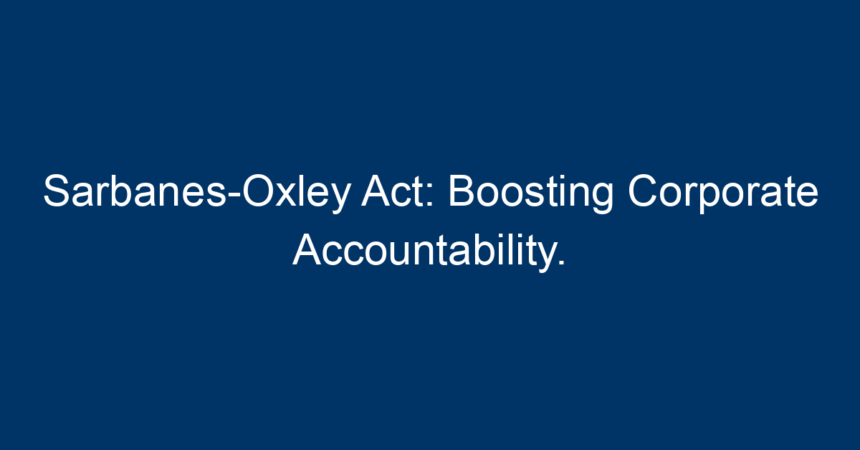In the wake of massive corporate scandals at the turn of the century, the Sarbanes-Oxley Act (SOX) emerged as a pivotal legislative response aimed at restoring public confidence in financial markets. Enacted on July 30, 2002, the Sarbanes-Oxley Act introduced stringent regulations designed to enhance corporate governance and accountability. In this article, we will delve into the details of the Sarbanes-Oxley Act, its implications for corporate accountability, and how it changed the landscape of American business.
Understanding the Sarbanes-Oxley Act
The Sarbanes-Oxley Act was a reaction to high-profile scandals involving major corporations like Enron, Tyco International, and WorldCom. These scandals not only devastated investors but also highlighted significant weaknesses in corporate governance and accounting practices.
Objectives of the Sarbanes-Oxley Act
The primary goals of the Sarbanes-Oxley Act include:
- Protecting Investors: Ensuring that investors receive accurate and truthful information about financial performance.
- Improving Corporate Governance: Establishing strict rules for corporate governance that promote ethical conduct.
- Enhancing Financial Disclosure: Mandating comprehensive financial disclosures to prevent misrepresentation.
Key Provisions of the Sarbanes-Oxley Act
The Sarbanes-Oxley Act is a comprehensive piece of legislation with several critical provisions:
1. Establishment of the Public Company Accounting Oversight Board (PCAOB)
One of the significant provisions of the Sarbanes-Oxley Act was the creation of the PCAOB. This independent oversight body regulates the audits of public companies, thereby ensuring that accounting firms adhere to strict standards and ethical practices.
2. Increased Financial Disclosures
Publicly traded companies are now required to provide detailed disclosures, including off-balance-sheet transactions and the use of pro forma figures. Companies must also disclose any material changes in their financial condition on a timely basis.
3. Internal Controls and Reporting
Section 404 of the Sarbanes-Oxley Act mandates that management and external auditors assess and report on the adequacy of a company’s internal controls over financial reporting. This ensures transparency and accountability in financial operations.
4. Corporate Responsibility for Financial Reports
CEOs and CFOs must personally certify the accuracy of financial statements. This provision places significant responsibility on top executives, deterring fraudulent activities and promoting ethical behavior.
5. Whistleblower Protection
The act offers protections for whistleblowers, encouraging individuals to report unethical practices without fear of retaliation. This is crucial for fostering a culture of integrity within organizations.
The Impact of the Sarbanes-Oxley Act on Corporate Accountability
The Sarbanes-Oxley Act has had profound implications for corporate accountability and governance. Here are some of the notable impacts:
Enhancing Transparency
Before the Sarbanes-Oxley Act, many companies engaged in deceptive practices that masked their actual financial health. With increased transparency mandated by SOX, investors can now make more informed decisions based on accurate data.
Strengthening Corporate Governance
The act has led to a noticeable improvement in corporate governance practices. Board oversight has become more robust, and companies are now required to have independent audit committees, fostering a higher level of scrutiny over financial reporting.
Building Investor Confidence
The Sarbanes-Oxley Act has played a crucial role in rebuilding trust in the integrity of financial markets. By holding companies accountable for their financial practices, investors are more likely to invest, knowing that there are legal frameworks in place to protect their interests.
Encouraging Ethical Culture
The emphasis on ethics and accountability has encouraged companies to adopt a culture of integrity. Organizations are now prioritizing ethical training and compliance programs to adhere to the regulations imposed by the Sarbanes-Oxley Act.
Challenges and Criticisms of the Sarbanes-Oxley Act
Despite its positive outcomes, the Sarbanes-Oxley Act has faced criticisms and challenges:
Compliance Costs
One of the primary criticisms of the Sarbanes-Oxley Act is the high cost of compliance. Smaller companies often find it burdensome to meet the extensive requirements, leading to concerns that it stifles growth and innovation.
Complexity of Regulations
The complex nature of SOX regulations can be daunting, leading organizations to struggle with understanding and implementing the required processes effectively.
Effectiveness in Preventing Fraud
While the Sarbanes-Oxley Act has improved accountability, some critics argue that it hasn’t completely eradicated corporate fraud. The continual evolution of fraudulent tactics means that ongoing vigilance is necessary.
Global Influence of the Sarbanes-Oxley Act
The Sarbanes-Oxley Act’s impact extends beyond the United States, influencing corporate governance practices globally. Many countries have looked to SOX as a model for developing their own regulations, leading to heightened standards in global finance and corporate accountability.
International Adoption of SOX Principles
Countries around the world have adopted similar principles inspired by the Sarbanes-Oxley Act, emphasizing the need for transparency, ethical behavior, and corporate accountability to protect investors and promote integrity in financial markets.
Cross-Border Compliance Issues
As companies operate in a global environment, the interplay between Sarbanes-Oxley compliance and international regulations poses challenges. Companies must navigate varying regulatory landscapes while adhering to the strict standards set by SOX.
Conclusion: The Future of Corporate Accountability
The Sarbanes-Oxley Act has indelibly shaped the landscape of corporate accountability. While it has faced criticism and challenges, its positive influence on transparency, governance, and investor confidence cannot be overstated.
Actionable Insights for Businesses
-
Invest in Compliance Programs: Companies should allocate resources to develop robust compliance programs to adhere to SOX regulations effectively.
-
Foster a Culture of Ethics: Organizations must prioritize ethical training and create an environment where employees feel empowered to report unethical behavior.
- Stay Informed on Regulations: Businesses need to stay updated on regulatory changes and adapt their practices to ensure compliance with evolving standards.
By embracing the provisions set forth in the Sarbanes-Oxley Act, companies can enhance their corporate governance practices and protect the interests of their investors, ultimately contributing to a more transparent and accountable business environment.




